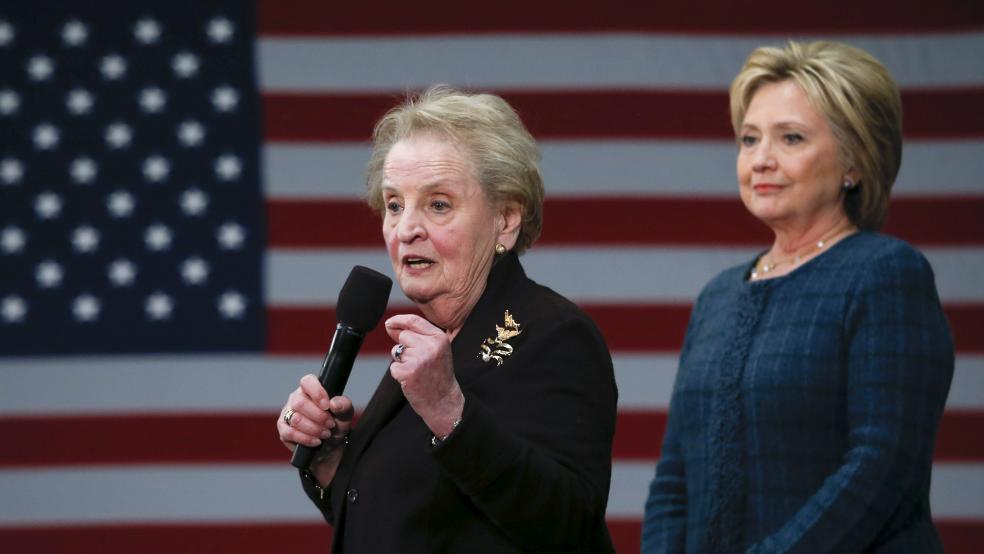Former Secretary of State Hillary Rodham Clinton hasn’t been well served by her surrogates in the final days of campaigning leading up to Tuesday’s critical New Hampshire Democratic primary.
On Sunday, former President Bill Clinton delivered a tirade against Sen. Bernie Sanders during an appearance in tiny Milford, NH. He accused the Vermont democratic socialist of making impossible promises like Medicare for all, dismissing anyone who disagrees with him as a “tool of the establishment” and fomenting sexist attacks on his wife and other women who stand up for her.
Related: Sanders Closes the Gap on Clinton – and Cleans Up Against the GOP
“When you’re making a revolution, you can’t be too careful with the facts,” Clinton told a small gathering of supporters at a high school in mocking Sanders’ call for revolutionary change in politics and the economy.
Bill Clinton’s dyspeptic speech in a state that helped lift his floundering presidential campaign in 1992 raised the eyebrows of many Democrats and was reminiscent of the way he lashed out against Barack Obama in South Carolina during his wife’s failed first campaign for the Democratic nomination in 2008.
But that pales by comparison with the huge missteps that two of the giants of the women’s movement – Gloria Steinem and former Secretary of State Madeleine Albright – made in the service of Clinton’s struggling campaign effort in New Hampshire over the past several days.
Steinem, the 81-year-old author, social activist and co-founder of the feminist movement in the late 1960s and early 1970s, only half-jokingly suggested last Friday during an interview with talk show host Bill Maher that young women are attracted to Sanders’ campaign because that’s a good way to meet boys. Albright, 78, the first woman to serve as secretary of state, glibly declared during a joint appearance with Clinton last week, “There’s a special place in hell for women who don’t help each other” climb the ladder.
Related: Clinton Attacks Sanders’ $14 Trillion Health Plan as ‘Wishful Thinking’
Clinton laughed, slowly clapped her hands and profusely thanked Albright. The message to women was clear: You have to be almost misogynistic to think seriously about voting for Sanders over Clinton.
The response came fast and furious over social media – and it was mostly bad news for Clinton.
“Shame on Gloria Steinem and Madeleine Albright for implying that we as women should be voting for a candidate based solely on gender,” Zoe Trimboli, a Sanders supporter from Vermont and a self-described feminist, wrote on Facebook, according to a report by The New York Times. “I can tell you that shaming me and essentially calling me misinformed and stupid is NOT the way to win my vote.”
“A basic lesson in politics is that you can't browbeat or guilt trip people into backing a candidate,” said Larry J. Sabato, a University of Virginia political scientists and the director of the Center for Politics.
Sanders, the champion of progressives and young voters, is leading Clinton by double digits in New Hampshire and is expected to win easily Tuesday’s first-in-the-nation Democratic primary. Clinton is desperately attempting to narrow Sanders’ lead, but she has been thwarted by a startling decline in support from women – especially young, idealistic college students who one might assume would want to help make history by electing the first female U.S. president.
Related: Clinton Insists She’s Not Beholden to Wall Street While Raking in $21.4 Million
Yet when contrasted with Sanders’ fiery rhetoric and sky’s-the-limit promises of universal health coverage and free college tuition, Clinton’s heavily policy-oriented speeches and pragmatic pronouncements on the limits to what can be done in Congress have little appeal to many younger voters, including women who feel no inherent loyalty to the 68-year-old former first lady.
Probably more than anything else, Clinton continues to suffer from widespread voter distrust in the wake of revelations over her mishandling of sensitive and classified emails while she served as Obama’s secretary of state and Sanders’ oft-repeated complaint that she is too closely allied with Wall Street and accepted $675,000 in speaking fees from Goldman Sachs.
Sanders drew huge support for young voters, including women, in last week’s Iowa Democratic caucuses. And a Wall Street Journal/NBC/Marist College poll of Democratic voters in New Hampshire last week showed that 64 percent of women under the age of 45 favored Sanders while just 35 percent supported Clinton.
Steinem and Albright have both apologized for their ill-advised public statements, but the damage has been done.





